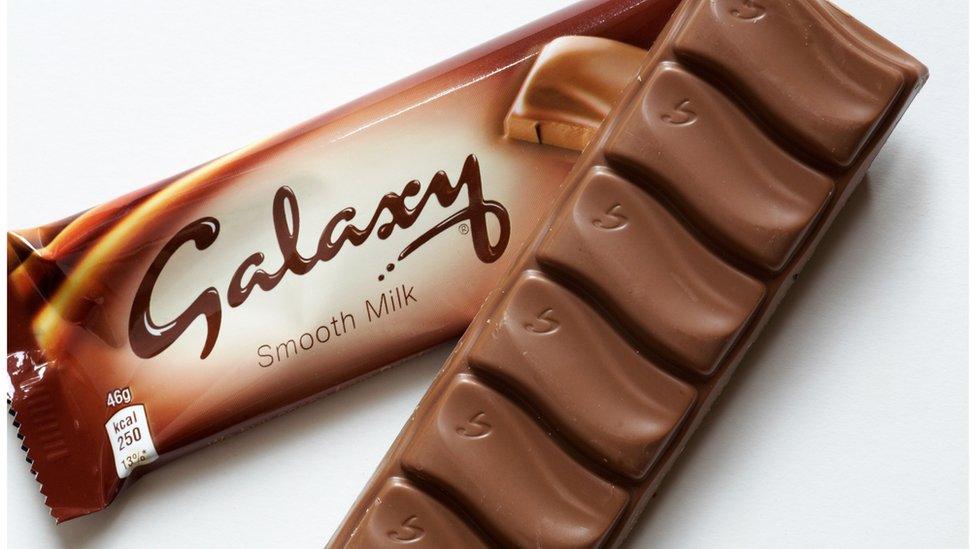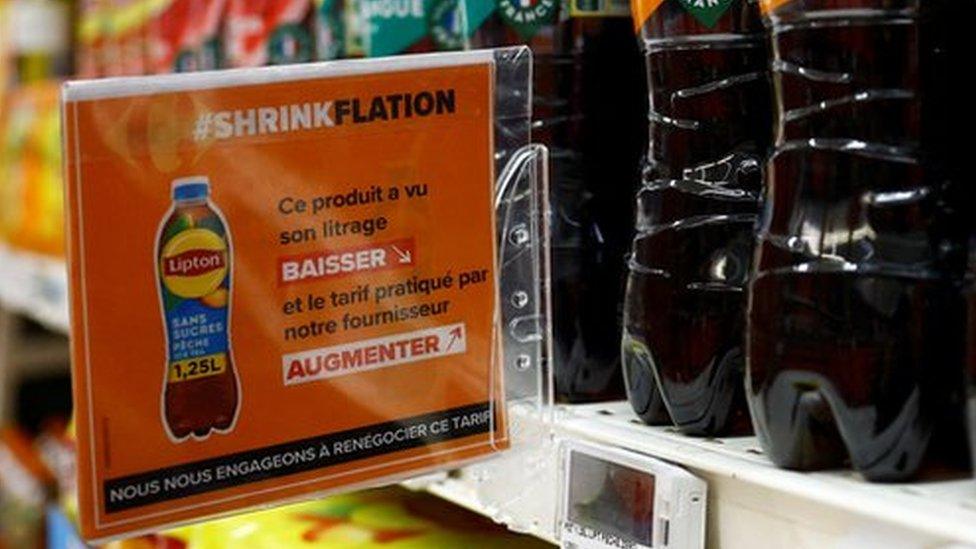Shrinkflation strikes again as Galaxy chocolate gets smaller
- Published
- comments

In these inflationary times it is a familiar experience: everyday items, from cat food to ice cream, are cut down in size while prices stay high or even rise.
The guardians of the Galaxy brand, Mars Inc, have decided to roll out this repeated plotline for its smooth milk chocolate bars.
They were 110g but are now 100g.
Last October, the recommended retail price for a bar of Galaxy chocolate was raised from £1.39 to £1.50.
But the size had remained the same - until last month.
A UK spokesperson for Mars said it was not a decision that was taken lightly but was "necessary".
"We have been actively trying to find ways to absorb the rising costs of raw materials and operations, as we know the increase in the cost of living has impacted both consumers and businesses," they said.
"Unfortunately, the growing pressures mean that more needs to be done."
In July, consumer group Which?, external reported research from Barclays which found that two-thirds of shoppers had noticed "shrinkflation" on everyday products, including Lurpak butter and Whiskas cat food.
But people said chocolate was the item they noticed most was coming in smaller portions, pointing to Penguin multipacks that now include seven biscuits rather than eight and Quality Street tubs which shrank from 650g to 600g.
The practice is legal as long as the quantity stated on the pack is accurate, but it can feel underhand.
That is because shoppers are "price conscious not net weight conscious" said Edgar Dworsky, founder of Consumerworld.org.
Brands know this and keep products at "familiar prices" in the hope we won't notice the "backdoor" price increase, he claimed, adding that it is up to consumers to pay close attention to these changes.
Earlier this month, the French supermarket giant Carrefour took a stance against shrinkflation, naming and shaming manufacturers by putting labels on shelves next to products like Nestle's infant milk formula and Lipton ice tea.
It was a strategy to put pressure on the big brands to look again at their pricing policies.
Pippa Malmgren, the economist credited with coining the phrase "shrinkflation" more than a decade ago, said brands are hoping shoppers won't register these changes.
"When they make you do mental maths, it's because they know most people are not good at that," she said.
Ms Malmgren does think we have already passed peak-shrinkflation though.
"Shrinkflation is usually an early indicator inflation is coming," she said, as manufacturers put off raising prices for as long as possible.
Now with "real" inflation here they have already done most of the shrinking they can get away with, she said.
Other strategies are now common, she pointed out, including additional fees for booking tickets and hotel rooms, and the "perfume-dimple" problem - the bottle with a hidden bulge in the bottom so it looks as though it is the same size but isn't.
"It's psychological, a way of duping the consumer into making a purchase without fully understanding the cost," she said.
But there's another even less visible ruse going on, pointed out Mr Dworsky.
"Skimpflation" sees the switching of expensive ingredients for cheaper ones, for example margarine where oil content is reduced and replaced with water.
"I understand when manufacturers are feeling the pinch, they need to find some way to pass it on to consumers. Unfortunately too many of them choose the sneaky way to do it," he said.

How can I save money on my food shop?
Look at your cupboards so you know what you have already
Head to the reduced section first to see if it has anything you need
Buy things close to their sell-by-date which will be cheaper and use your freezer

Related topics
- Published14 September 2023

